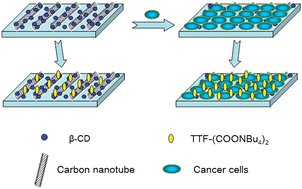In this contribution, we have prepared and explored a novel nano-interface based probe for the rapid identification and highly sensitive detection of cancer cells by means of an electrochemical study. The new probe tetrathiafulvalene (TTF) carboxylate salt (TTF-(COONBu4)2, ditetrabutylammonium salt for propylenedithio-4′,5′-tetrathiafulvalene-4,5-dicarboxylate), which has specific spectral and electrochemical properties, has been synthesized and assembled with carbon nanotubes to form a new type of nanocomposite. A simple method of fabricating the β-CD/MWCNT modified electrodes based on functionalized multi-walled carbon nanotubes (MWCNTs) and β-cyclodextrin (β-CD) has been explored by using glassy carbon electrodes (GCEs), which could remarkably enhance the sensitivity of the biomolecular detection. Our results demonstrate that the combination of the new probe TTF-(COONBu4)2 with β-CD/MWCNT modified electrodes could be readily utilized to sensitively detect cancer cells such as liver cancer cells SMMC-7721 and HepG2, drug sensitive leukemia K562/B.W cells and drug resistant leukemia K562/ADM cells, with a detection limit of ∼103 cells mL−1. This may provide a novel strategy for the potential and promising application of the new TTF molecular probe in the development of multi-signal responsive biosensors for the early diagnosis of cancers.

You have access to this article
 Please wait while we load your content...
Something went wrong. Try again?
Please wait while we load your content...
Something went wrong. Try again?


 Please wait while we load your content...
Please wait while we load your content...